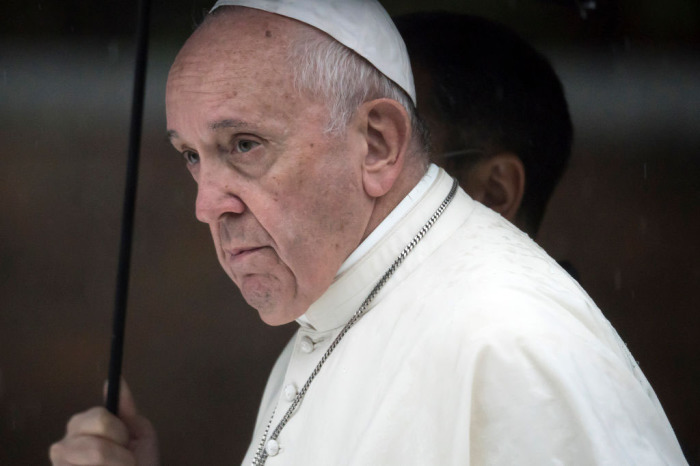
Pope Francis, the first Latin American pontiff in the history of the Roman Catholic Church who was known for giving a renewed sense of welcome to the global religious institution while also stirring controversy over some of his comments and actions, has died at age 88.
Vatican News posted an announcement by Cardinal Kevin Farrell, camerlengo of the Apostolic Chamber, stating that the pontiff passed away on the morning of Easter Monday.
His death came hours after he gave a traditional Easter blessing on Sunday from the balcony of St. Peter’s Basilica in what turned out to be his last public appearance. The pope recently finished a lengthy stay at a hospital in Rome in which he battled double pneumonia and was considered by many to be near death.
“At 7:35 this morning, the Bishop of Rome, Francis, returned to the house of the Father. His entire life was dedicated to the service of the Lord and of His Church. He taught us to live the values of the Gospel with fidelity, courage, and universal love, especially in favor of the poorest and most marginalized,” stated Farrell.
“With immense gratitude for his example as a true disciple of the Lord Jesus, we commend the soul of Pope Francis to the infinite merciful love of the One and Triune God.”
Born Jorge Mario Bergoglio in Buenos Aires, Argentina, on Dec. 17, 1936, he was one of five children from an Italian immigrant couple and was ordained a priest in 1969.
Bergoglio became archbishop of Buenos Aires in 1998 and then was made a cardinal by Pope John Paul II in 2001. He held other prominent leadership positions in the Catholic Church, including grand chancellor of the Catholic University of Argentina and ordinary for Eastern-rite faithful in Argentina. He was a member of the Congregation for Divine Worship and the Discipline of the Sacraments.
On March 13, 2013, Bergoglio was elected pope, succeeding Pope Benedict XVI, who became the first pontiff in nearly 600 years to step down from office rather than die in power.
In addition to being the first pope from Latin America, Bergoglio was also the first pontiff to belong to the order of the Society of Jesus, also known as the Jesuits. Upon becoming pope, Bergoglio took the name Francis in honor of St. Francis of Assisi.
Pope Francis developed a reputation for being more inclusive than his predecessor, gaining headlines for comments he made in July 2013 where he said, “If a person is gay and seeks God and has good will, who am I to judge him?”
Although the comments were consistent with longstanding Catholic Church teaching, and the pontiff has since reaffirmed that homosexuality is a sin, many interpreted his remarks as changing the Catholic Church’s approach to how it treated the LGBT community.
In 2023, Francis approved a measure from the Vatican’s Dicastery for the Doctrine of the Faith to allow Roman Catholic priests to offer blessings to same-sex couples, as long as the blessing is not considered akin to marriage, while still labeling such relationships sinful.
In 2015, Francis became the first pope to address a joint session of U.S. Congress, giving a 50-minute-long speech that touched on such issues as care for immigrants, protecting the planet, protecting life at all stages of development and the dangers of ideological extremism.
“This means that we must be especially attentive to every type of fundamentalism, whether religious or of any other kind,” Pope Francis told the members of Congress.
“A delicate balance is required to combat violence perpetrated in the name of a religion, an ideology or an economic system, while also safeguarding religious freedom, intellectual freedom and individual freedoms.”
As with his immediate predecessors, Francis dealt with the ongoing fallout from the priest sex abuse scandal within the Catholic Church, with more revelations being announced of past abuse and coverups in various dioceses across the world.
In February 2019, Francis opened a summit titled “The Protection of Minors in the Church,” featuring approximately 200 Catholic Church leaders worldwide.
“The holy People of God looks to us and expects not simple and predictable condemnations from us, but concrete and effective measures to be undertaken. We need to be concrete,” said the pontiff in a speech at the summit.
Francis weathered allegations that he directly covered up acts of abuse. In 2018, former Vatican official Archbishop Carlo Maria Viganò accused Francis of knowing about credible allegations of abuse directed at Cardinal Theodore McCarrick but covering for McCarrick and even putting him in a position of power in the Vatican.
A Vatican report released in 2020 later showed that Francis was only “vaguely aware” of the allegations against McCarrick and that he was told that the allegations were “reviewed and rejected by Pope John Paul II” and thus “Pope Francis did not see the need to alter the approach that had been adopted in prior years.”
Francis was also known for increasing the presence of women in positions of authority within the Catholic Church, albeit without changing the denomination’s longstanding ban on female ordination.
In 2018, Francis appointed three female theologians to the Catholic Church’s prominent Congregation for the Doctrine of the Faith, the first time women and laity served in that entity.
In April 2023, Francis decided to let women be voting members of the Synod of Bishops, which marked the first time this was allowed since the advisory body was created over 50 years ago.
The pontiff announced in January that he appointed Sister Simona Brambilla of the Consolata Missionaries to serve as prefect of the Dicastery for Institutes of Consecrated Life and Societies of Apostolic Life. It marked the first time a woman headed a dicastery.
Last September, Pope Francis garnered controversy for remarks he made at an interreligious meeting with young people at a Catholic junior college in Singapore when he appeared to endorse universalism.
“If you start to fight, ‘my religion is more important than yours, mine is true and yours isn’t,’ where will that lead us?” he asked, according to Crux Now. “There’s only one God, and each of us has a language to arrive at God. Some are Sheik, Muslim, Hindu, Christian, and they are different paths [to God].”
Bishop Joseph Strickland, who oversaw the Roman Catholic Diocese of Tyler, Texas, until his dismissal by the Vatican last year, told supporters in a post to X to “pray for Pope Francis to clearly state that Jesus Christ is the only Way. To deny this is to deny Him. If we deny Christ, He will deny us, He cannot deny Himself.”
In 2022, Francis began to experience a series of various serious health issues, which included the need to use a wheelchair to get around due to chronic knee pain.
The pontiff was hospitalized in March 2023 at the Gemelli Hospital in Rome with a respiratory infection, eventually undergoing treatment that took a few days before being released.
In 2014, after completing a five-day trip to South Korea, Francis told reporters that he probably only had “two or three years” left to live and openly considered resigning like his predecessor.
“I try to think of my sins, my mistakes, so as not to think that I am somebody,” Francis said at the time. “Because I know this will last a short time, two or three years, and then to the house of the Father.”


















